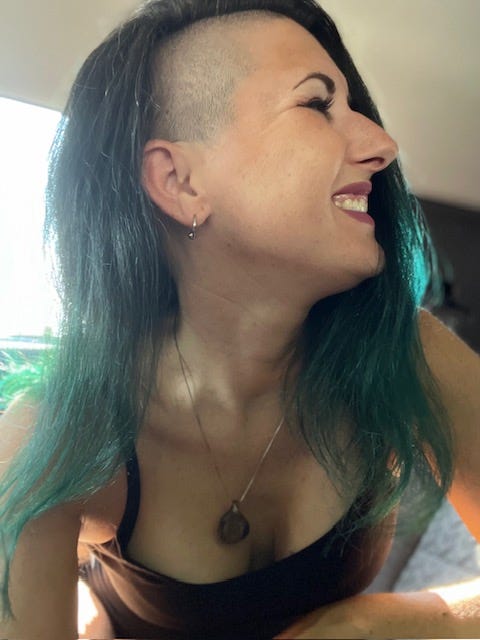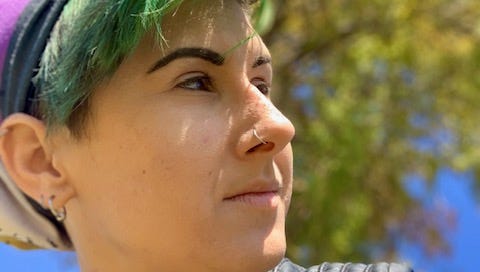The Realities of Autistic & NeuroDivergent Camouflaging (Masking)
NeuroDivergent Camouflaging is a survival skill that can be engaged in consciously or subconsciously. It is not something we do to be manipulative or deceptive.
Neurodiversity, a normal and natural part of human variation, encompasses the diversity of the brain and nervous system.
The human brain, body, and nervous system can exhibit variety in various ways. Still, these differences may not be readily apparent to outsiders (due to misunderstandings and assumptions because of these differences being hidden within the person's brain).
The world we live in isn't always safe for NeuroDivergent People.
While NeuroDivergence is a natural part of humanity, many NeuroDivergent People report not feeling safe or able to be open with their NeuroDivergence and express facing pressure to mask, camouflage, deny, or tone down their experiences for fear that being open could cause harm to them harm (either physical harm, emotional harm, or harm to their reputation, families, or livelihoods) or create problems in their lives.
Because of these risks (which can include ridicule, ostracisation, or even, in some cases, institutionalization or the loss of rights and autonomy), many NeuroDivergent People are left with little choice but to do their best to blend in (even if blending in fully is impossible).
What IS NeuroDivergent Camouflaging?
NeuroDivergent Camouflaging, also sometimes called masking, is not something we do to be deceptive or manipulative. It is a survival skill that can be engaged in consciously or subconsciously.
Camouflaging involves suppressing or hiding one's true self to conform to societal norms, often at a tremendous personal cost.
When I was busy presenting an "ideal version" of myself to the world, it made me feel as if the other parts of myself were shameful and unworthy, which ate away at my mental health.
Additionally, when I was only being who I thought I was supposed to be (instead of my true self), I was isolated and alone because the people who surrounded me were people who wouldn't accept me for who I was—and whenever my mask slipped, they would often react poorly (because they didn't like the real me).
If you've ever heard the phrase "alone in a room full of people," it described my experience (before learning I was Autistic) perfectly.
When I was camouflaging my Autistic traits, it held me back because I was out of touch with my own wants and needs.
I'd masked myself so hard, and for so many years, I didn't even know who I was anymore.
Learning I was Autistic was a catalyst moment for me because it woke me up to the fact that I'd been gaslit by society my entire life (about who I was, my needs, strengths, and weaknesses), which was a core trauma that I'd experienced at a very young age.
For me, learning the truth was the beginning of a healing journey, a way of getting to know myself again after becoming disconnected from all that I was (outside of other people's expectations).
Many years ago, I'd lost myself to the mask(s).
Learning the truth about my brain was like being handed myself a map, starting my quest to recollect all of my parts and broken pieces.
For most of my life, I did my best to blend in, camouflaging my NeuroDivergent traits because my survival depended on it. Yet, recently, my environment has been much safer (thanks to the fact that I started to re-design my life after being diagnosed Autistic almost 8 years ago now).

Now that things are much more stable, my guard and the walls have started coming down; I find myself camouflaging less and less (though there are still things I do camouflage (whenever I'm not feeling safe in an environment or with someone).
Looking back, I can see how much harm I did to myself by leaning into this maladaptive survival skill, putting away parts of myself that society and the people around me weren't ready to greet with compassion.
I hated the parts of myself that society frowned upon and saw them as enemies that I had to defeat (despite the fact that these traits were not going anywhere). It was an unhealthy way to live.
Much of how I stuck out, eventually, after years of self- beratement, I was able to "tone down," at least in the short term, but there were also things I couldn't hide.
Many forms of NeuroDivergence are invisible, but some are not.
Some of my NeuroDivergent traits are invisible, and some are not. When I was younger (and my mask was less developed), my Autistic and ADHD traits, especially, were much more visible than they are today. Back then, I could not hide, no matter how hard I tried.
Additionally, even if someone's NeuroDivergence is invisible TO YOU, it doesn't mean that a person's internal experience is not significantly affected by their difference(s).
These are both important considerations for people to keep in mind - that some NeuroDivergence is visible (full time or part time) because functioning and camouflaging ability can fluctuate day to day, and that internal experiences can be vastly different from external presentations.
There are many ways one can be NeuroDivergent.
People often think and talk about NeuroDivergence encompassing differences people are born with (like Autism, ADHD, Dyslexia, etc.), but fail to recognize that not everyone who's NeuroDivergent (has a brain that diverges from average) was born that way.
It is important to recognize that any difference in how you experience the world around you (including your emotions, sensory experience, the way you process information and communicate, or neurological differences in how people move) is all a form of NeuroDivergence. That's a broad spectrum.
It's crucial to understand that regardless of the nature (or duration of) someone's NeuroDivergence, they have a unique experience that may require our understanding and support to thrive in a world that often caters to the neuro-normative average.
Paid subscribers have access to the rest of the story. Thanks to every one of you for supporting my work.
If you are in need of a discount, please use the link below to get your subscription at a deep discount (because I don't want money to be an obstacle to people):
https://neurodivergentrebel.substack.com/LowIncomeDiscount
For readers experiencing financial hardship, please note that this offer is exclusively for you. This discount is offered on the “honors system” - I am not going to ask anyone for proof.
Please, kindly refrain from taking this offer if you do not need it.
I hope this helps,
- Lyric
Keep reading with a 7-day free trial
Subscribe to NeuroDivergent Rebel’s Substack to keep reading this post and get 7 days of free access to the full post archives.





